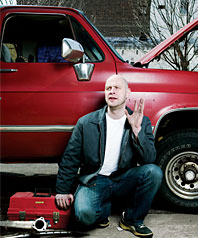
About ten years ago, a friend bought a 1987 Chevy Blazer. It’s a pre-SUV-craze SUV with four-wheel drive, bouncy suspension, and a gun rack. Few vehicles in automotive history have ever broken down as frequently and spectacularly. It became a joke among our friends—we all laughed when the fuel injector caught fire, made fun of him when the engine seized, and gasped when its enormous 35-gallon gas tank sprang a leak and turned Degraw Street into a miniature Bay of Valdez. “Get rid of that piece of crap,” we told him. After a few years, he finally did; he sold it to me for $1,500.
I always kind of knew I’d end up with the Blazer. Ever since I was old enough to drive, I’ve owned a series of crap cars—first out of economic necessity, later because I couldn’t help myself. Inevitably, they have broken down, and I’ve spent hundreds of hours lying on city streets pouring over manuals by Haynes and Clymer (publishers of the undisputed canon of auto repair) learning how to fix them. Now that I can afford a new car, it’s too late. I’ve become an urban grease monkey.
Like so many people in the city, I spend obscene hours in an office. When things get hard at work or in my personal life, I find myself drawn not to the gym or the local bar (well, sometimes the bar) but to the Chevrolet. There is something soothing about plugging away at its famous small-block V-8, adjusting the timing, getting the heat to work. It’s a form of protest against the preciousness and learned helplessness of the city, and it tests my mind in a way that sitting in front of a computer never does. Under the hood, practical lessons in math and engineering abound. The basics of, say, the compounding effect of forcing fluid from the master cylinder through a thin line to the break cylinder come to life each time a pierced brake line squirts fluid on your arm. Plus being out there on the sidewalk all the time gives you an intimate understanding of urban life. A guy who casually walked away with my toolbox on Great Jones Street taught me to never let a single personal possession out of my sight. Residents of million-dollar apartments really don’t like it if you pile greasy car parts in front of their building—though, wonderfully, there’s really nothing they can legally do about it (even if they do sic their doormen after you). It is, however, against the law to spill oil, transmission fluid, or antifreeze on the street, which a lady walking a collie once reminded me of in less than pleasant terms.
The city is getting harder on grease monkeys all the time. In 1994, I moved to a loft in Williamsburg. Back then, my block was a street mechanic’s heaven: no parking signs and few dared to leave their cars out overnight. I used to pull a Dumpster into the street to serve as a workbench. Nobody cared, and nobody got in my way. Now, the block is lined with Land Rovers and Volvos and I can barely find a spot. Any day, I expect one of my stylish new neighbors to ask me to keep my tools off the sidewalk, and that’s when I’ll know that I have to sell the Blazer, or maybe just move.